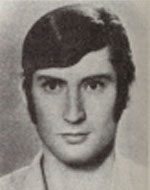Berger, Meir
Meir, son of Rivka and Kehat, a Holocaust survivor, was born in 1948 in Vienna, Austria, and immigrated to Israel with his family at the age of 2. He graduated from the Hashmonaim School in Ramat Gan, Dvir, “where he graduated from high school, was a good student, diligent and disciplined, and was known to be a devoted and beloved friend who was always willing to help others, who was loyal and devoted to his family, respected his parents and greatly appreciated their views. To the IDF in early May 1967 and was assigned to the Armored Corps. Shortly after he enlisted, the Six-Day War broke out and he participated in battles until Victory Day. After being trained as a armored officer, he was assigned to the 7th Brigade and participated in many operational activities. At the end of 1968, he was sent to the Armored Corps School to study in a tank commanders’ course. He completed this course with honors and was therefore left in the Armored Corps School as a guide in tank commander courses. During that time he participated in the Karameh operation, in which he was discovered as a fighter with initiative and resourcefulness, who was able to withstand difficult situations under conditions of pressure and danger. During his service in the army, he bought him a wide circle of friends for his kindness, good temper and honesty. His friends knew that when they needed help, Meir was the address to which they would turn, because they would always be willing to give and help. Little things that ran out of them all were always available to Meir and his hand was always open to everyone. In May 1970, Meir was discharged from regular service and enrolled in Tel Aviv University, specializing in mathematics and economics. Along with his studies, he went to help his father, who needed help in his business. During his studies, he was called for periods of reserve service and fulfilled his national duty, like his fellow soldiers. When the Yom Kippur War broke out, Meir was one of the first armored personnel carriers to enter the Golan Heights on the eve of Yom Kippur, in order to fight to contain the invading Syrian forces. Two days later he was wounded, but refused to go to receive medical treatment and continued fighting. At the end of that day he was among the few who returned from the front. He was transferred to the rear, put on his clothes, and went back to the front to continue fighting. After breaking into the enclave with his unit, he reached the peak of his exploits as commander and soldier. He fought all day, hit and destroyed many targets. In the afternoon, in the battle of Tel Antar, his tank was hit and Meir was killed. He was laid to rest in the military cemetery in Kiryat Shaul. Survived by his parents and brother. After his fall, he was awarded the rank of First Sergeant. In his memoirs, his commander wrote: “Meir was known to us as a quiet, disciplined young man with excellent professionalism in tanks and armor, and he came to us from the 7 th Brigade with extensive experience in operational service that helped him and us during the war. He was determined, a great fighter, his strength and his nerves stood in the most difficult moments, but death achieved before he could see the enemy’s attack break and his fighters receded.
